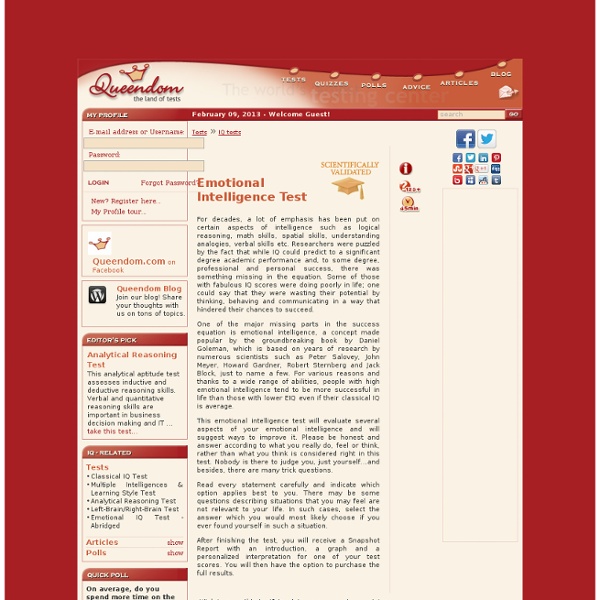What is your emotional IQ?

Make a homepage in minutes
Flavors.me: creare una pagina web con la nostra identità sociale online
Pubblicato da Alberto Email Flavors.me è un nuovo servizio che ci permette di creare una elegante pagina web con la nostra identità sociale online. Si tratta di uno strumento che funziona un po’ come aggregatore di social network, un po’ come pagina iniziale, un po’ come generatore di siti web, un po’ come strumento per il lifestreaming, un po’ come carta di identità sociale. Bisogna registrarsi gratuitamente per creare la nostra pagina personale. A questo punto possiamo iniziare ad inserire i link verso le reti sociali cui siamo registrati. Al momento include siti come: Flickr, FaceBook, Last.fm, Posterous, Netflix, LinkedIn, Blogger, GoodReads, Twitter, Foursquare, YouTube, WordPress, Tumblr, Etsy. L’aspetto decisamente più cool di Flavors.me, tuttavia, è la personalizzazione del design. I risultati che si possono ottenere sono davvero splendidi da un punto di vista grafico. Post correlati
IBM's BPM BlueWorks
Exclusive offer: get 50% off this eBook here WS-BPEL 2.0 for SOA Composite Applications with IBM WebSphere 7 — Save 50% Define, model, implement, and monitor real-world BPEL 2.0 business processes with SOA-powered BPM for IBM WebSphere 7 with this book and eBook by Matjaz B. Juric | November 2010 | BPEL Enterprise Articles IBM SOA IBM's BPM BlueWorks is a cloud-based BPM entry point offering that allows business users (including leaders and analysts) to create, share, and collaborate on strategy maps, capability models, and process models. In this article by Matjaz B. WS-BPEL 2.0 for SOA Composite Applications with IBM WebSphere 7 (For more resources on IBM, see here.) The core intent of BPM BlueWorks is not only to allow you to quickly ramp onto BPM, but also to allow you to: In BPM BlueWorks, the Business Design spaces provide the web-based, collaborative environment for designing and building business documents as a part of the solutions or applications you intend to build. Strategy maps
Zuppaa.com
Get a better resume, online.
“...easy to use without any technical expertise; if I did it, anyone can...” More Coverage... Watch this two-minute video to learn about VisualCV and how it can help you today. Watch full size video here... Tune into the latest VisualCV webinars to learn how to get more out of VisualCV.com. Learn more, watch webinars and register here...
Related:
Related:



